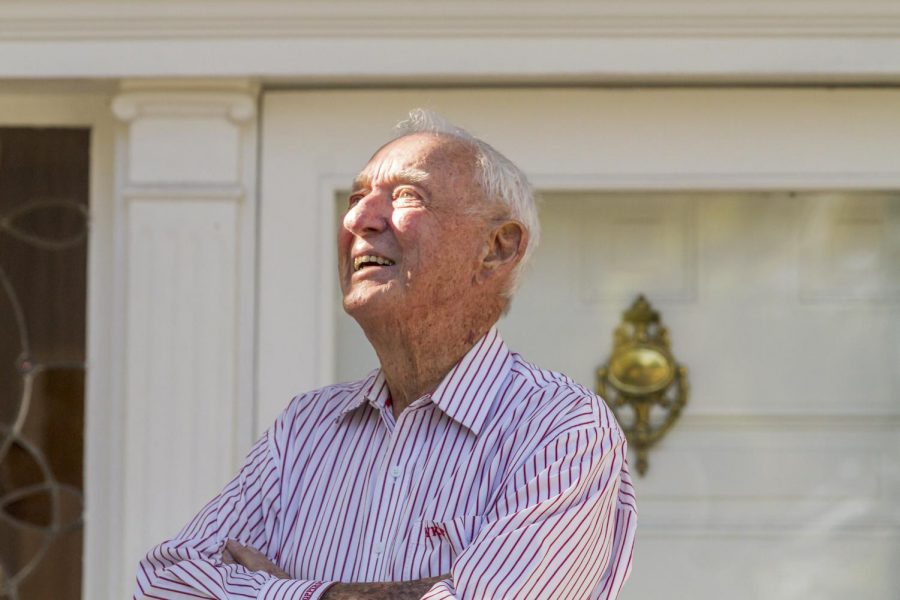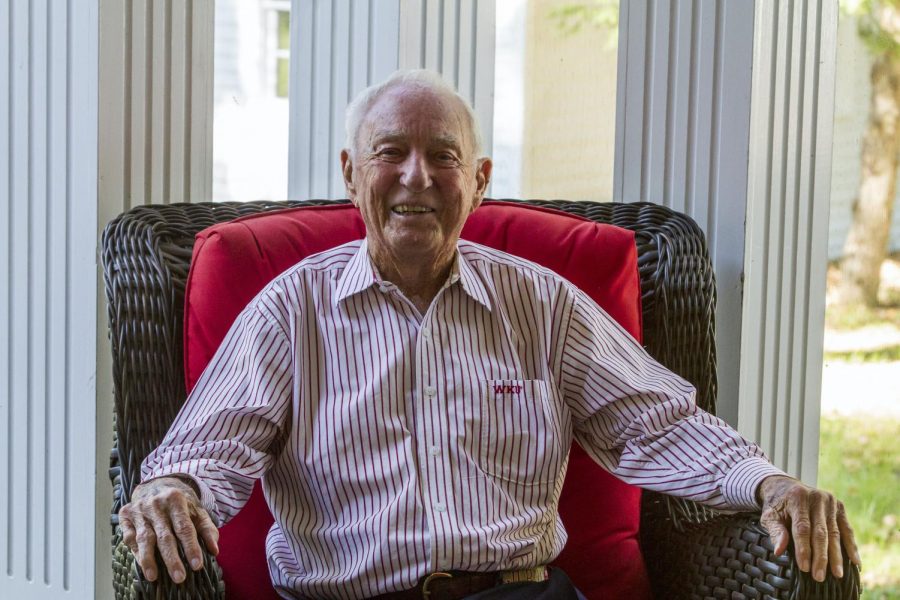‘I just wanted to be at Western’: Lee Robertson reflects on his time on the Hill
Lee “Mr. Western” Robertson, a McLean County native, served WKU for over 70 years.
October 30, 2021
Editor’s Note: A previous version of this story includes some factual errors. The story has been updated with the correct information. The Herald regrets the error.
Next year Lee Robertson will be celebrating his 100th birthday and his 62 year on WKU’s campus, a place he came on a whim after his service in World War II, and a place he’s called home ever since.
Lee “Mr. Western” Robertson, a McLean County native, has served WKU for over 60 years and is still serving in a part-time and sometimes voluntary role at the Cliff Todd Center previously working as a Special Assistant to the Vice President of Institutional Advancement. Robertson is now special assistant to the vice president of Philanthropy and Alumni Engagement.
“Live in moderation and look on the positive side,” Robertson said is the main take away from his 99-years on this earth, and is a long held mantra that got him through his service as a young man in World War II.
During WWII, Robertson was a tank driver serving in New Guinea, Morotai and the Philippine Islands, before eventually occupying Japan after the U.S. dropped the atomic bombs. Japan surrendered.
This was when Robertson learned how important having a positive outlook on life is, recalling the outlook of one his fellow tank crewman who was killed after talking about how he thought he would die.
“There was a guy in my tank crew from Akron, Ohio, and he was pessimistic,” Robertson said. “When we left to go over to New Guinea, we went under the Golden Gate Bridge and he said ‘I’ll never see it again’—and that might not have anything to do with it—but he was the only negative thinker in that five man crew and he didn’t make it.”
The crewman from Ohio is the only one that died, three other members were wounded during their campaign, and Robertson “didn’t get a scratch.”
On Dec. 1, 1945, Robertson boarded an aircraft carrier in Tokyo, Japan to begin his trip home, arriving in San Diego on December 15, and back at Fort Knox on December 23, Robertson said.
Robertson’s family was in Calhoun, and the original plan was to catch a bus from Louisville to neighboring Owensboro, but sleet had created hazardous conditions, so Robertson had to catch a ride to Owensboro. He arrived at his house at 5 a.m. on Dec. 24, 1945.
“My brother Sam, who’d been in the 101st Airborne—and he’d made the initial landing in Normandy and had gotten wounded—had gotten home two weeks before me and was alright,” Robertson said. “We have a sister, she was there; my mom and dad were there; it was a pretty good Christmas.”
For a while after returning from war, Robertson and his brother didn’t work while reacclimating to normal society, when Robertson was approached on a Sunday afternoon in June of 1946. A friend of his approached him sitting in the yard and said, “Lee, let’s go to college.”
“When I graduated high school—the class of [41’]—you didn’t go to college,” Roberson said. “I said, ‘I can’t afford college,’ and he asked me if I’d hear of the G.I. Bill? I said no, and he explained it to me. I said ‘alright, let’s go to college, where is one?’ and the rest of my life has been Western Kentucky University.”

After graduating in 1950 from WKU, Robertson went on to become a coach, principal and superintendent of two different school systems over the next ten years. He still remained very active in the WKU community.
“When I was asked to come back and work at Alumni Affairs at Western, I jumped for joy,” Robertson said. “When they asked me to come back, even know I was making less salary than I was making as superintendent of schools at Barren County, I did it because I just wanted to be at Western.”
In his time on the Hill, Robertson has known some celebrated and influential people at WKU, including legendary coach and namesake of the basketball arena on campus, E.A. Diddle.
Robertson played baseball at WKU, and recalls his time as a pupil of E.A. Diddle’s was a period that impacted his life greatly, inspiring him to get into coaching and to study education.
While Robertson’s impact on WKU continues to be felt, he also is a family man with two children, three grandchildren, and two great-grandchildren with one on the way, after having been married to his wife Joyce for 68 years.
As Robertson gets older and reflects on his life, one of the things he has been forced to grapple with is something he hasn’t previously thought about, his own mortality.
“One of the things I wish I wouldn’t do—and I don’t know if I can escape it or not—but the last couple of years I’ve been thinking about the end of my life and I’ve never thought about that before,” Robertson said.
Being involved helps keep Robertson young, working at WKU up to 100 paid days per year without impacting his retirement. At the age of 99, his mortality is something that motivates him to be very active.
“I feel like right now I’m productive, I’m helping these people, and I’ll get out of here when I feel like I’m not doing any good,” Robertson said. “Right now it’s hard for me to believe I’m that age because I don’t feel old, and I think that helps you to live.”
In reflecting on his life, Robertson says he had no regrets at all.
“I’ll quote from Mr. Diddle, he said, ‘if I had to do it all over again, I just might,’ I’d do it with the same people I’ve done it with,” Robertson said. “I wouldn’t change much, and if I had to change it all, I wouldn’t change anything.”
Michael Dylan Payne can be reached at [email protected]. Follow him on Twitter @mdpayne_.













